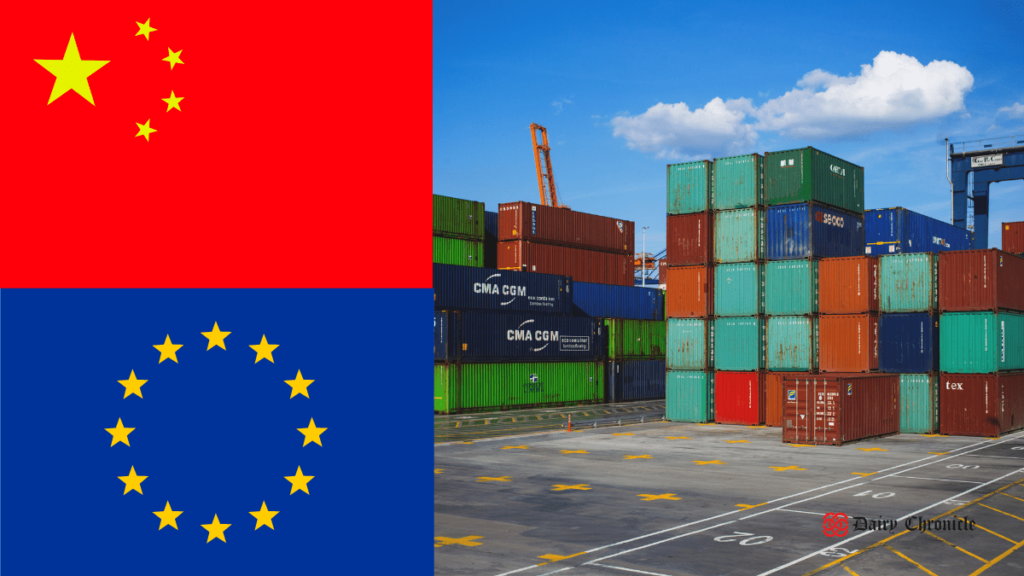China has expanded its trade investigations into EU imports, now including dairy products like cheese, milk, and cream, alongside ongoing probes into brandy and pork. This move adds pressure on EU countries, particularly France, Spain, the Netherlands, and Denmark, who are significant exporters to China. The investigations are seen as a response to the EU’s proposed tariffs on Chinese electric vehicles, highlighting growing trade tensions.
China has recently intensified its trade scrutiny on European Union (EU) imports by launching an anti-subsidy investigation into EU dairy products such as cheese, milk, and cream. This move comes shortly after China began assessing whether EU brandy and pork imports are being sold below market rates. The expanded investigation has caught the attention of several EU member states, particularly as tensions rise over a new EU proposal to impose tariffs on Chinese-made electric vehicles (EVs).
China’s Latest Trade Actions
China’s recent actions are part of a broader strategy to counter the EU’s revised tariff plan on Chinese EVs, which proposes levies of up to 36.3% on these imports. Beijing’s probe into the dairy sector adds to its ongoing investigations into other EU goods, including brandy and pork, indicating a widening trade dispute between the two economic giants. The Chinese government is particularly scrutinizing whether EU dairy products benefit from state subsidies, which it claims could constitute unfair trade practices.
EU Nations Under Pressure
The latest investigation puts a spotlight on several EU countries that are significant exporters of dairy and other products to China. France, Spain, the Netherlands, and Denmark are the most affected by these probes, given their substantial exports to the Chinese market. France, for instance, exported $211 million worth of dairy products to China last year, making it one of the largest EU dairy exporters. Similarly, Italy, Denmark, and Spain exported significant amounts, with figures reaching $65 million, $55 million, and $49 million, respectively, in dairy products.
China’s actions are seen as a direct response to the EU’s proposed tariffs on Chinese EVs. In a recent advisory vote on the tariffs, countries like France, Italy, and Spain supported the measures, while Germany, Finland, and Sweden abstained, showcasing a divided stance within the EU on trade policy with China.
Impact on European Exporters
The ongoing trade investigations could significantly impact EU countries that are key players in the global dairy, brandy, and pork markets. France, Denmark, the Netherlands, and Spain are the largest exporters of these goods to China. With China accounting for 99% of its imported brandy from France alone, any restrictions or tariffs could severely affect these industries.
France is particularly vulnerable due to its sizeable dairy and pork exports. Denmark, the Netherlands, and Spain also stand to face significant losses if Beijing decides to impose penalties or restrictions as a result of its findings. This development could force European exporters to seek alternative markets or potentially suffer financial losses if trade with China becomes more restricted.
Future Developments
China’s state-run media outlet, the Global Times, hinted at the possibility of further trade investigations, including a potential anti-dumping probe into European large-engine gasoline cars. Although such an investigation has not yet materialized, it could primarily impact Germany, which exported $1.2 billion worth of vehicles with engines of 2.5 liters or more to China last year. If China moves forward with this investigation, it could further escalate trade tensions between China and the EU, especially if significant tariffs or trade barriers are introduced.
China’s expanding probe into EU imports reflects a growing trade friction that could have far-reaching consequences for both regions. With several European countries already feeling the heat from these investigations, the situation underscores the complexities of international trade relations in an increasingly interconnected global economy. As both sides weigh their options, the outcome of these probes will likely have significant implications for future EU-China trade relations and the global market landscape.



